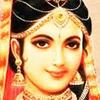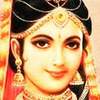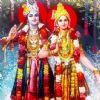This is my take on Yudhishthira's actions in the dice game.
I possess a keen interest in the Mahabharata. I have been adequately exposed to the KMG version of the epic (something that is commonly used on this forum as well). I have also watched BRC MB as well as Star Plus MB. So I am aware of the distortions, variations, and interpretations when it comes to the most well-known televised adaptations of the epic.
Kindly note that I have used citations from KMG in this post. Therefore, I am making it clear that I am NOT citing nonsensical distortions such as Duryodhana staking his wife Bhanumati (shown in Star MB which NEVER happened in the epic).
First of all, why did I choose this topic and decide to give my take on the issue?
I feel a certain bias is seen when it comes to the consequences of the dice game. The sins committed by Karna, Duryodhana, Dushasana, Shakuni definitely came back to bite them during the Kurukshetra War. And they deserved whatever they ultimately got.
Drona and Bhishma were pulled up for their silence during Draupadi's humiliation (despite themselves not actually insulting her).
But what about Draupadi's own husband who staked her like chattel, reducing her to property - which led to her ultimate humiliation?
What about him ordering her to be present in the dice hall despite her questioning her own staking and not being a proper enough state (not adequately dressed and menstruating)?
I'm NOT saying DDSK had the right to behave with her as they wished (just because she was reduced to servitude).
But when it comes to the entire dice game saga, I personally feel that any and all justification is used (by those supporting the Pandavas) for excusing Yudhishthira's actions in the dice hall - just because Krishna supported the Pandavas in the Kurukshetra War.
DDSK rightly faced the consequences of their actions committed in the dice hall, but what about Yudhishthira? The 12 year exile was NOT and CANNOT be regarded as a punishment for the staking. It was only a consequence of losing the second dice game.
Let me state right at the outset that unlike what was shown in StarMB, Yudhishthira was NOT forced to stake ANYBODY in the epic. Shakuni did NOT manipulate Yudhishthira's rigid adherence to dharma against him (as was incorrectly shown in StarMB).
Now that this has been clarified, let me give my own perspective -
The game of dice was organized by Shakuni in the Hastinapura assembly hall in order to avenge Duryodhana being mocked in the mayasabha in the aftermath of the Rajsuya yagya of the Pandavas.
"That bull among men, Duryodhana, continued to dwell in that, assembly house (of the Pandavas). And with Sakuni, the Kuru prince slowly examined the whole of that mansion, and the Kuru prince beheld in it many celestial designs, which he had never seen before in the city called after the elephant (Hastinapore). And one day king Duryodhana in going round that mansion came upon a crystal surface. And the king, from ignorance, mistaking it for a pool of water, drew up his clothes. And afterwards finding out his mistake the king wandered about the mansion in great sorrow. And sometime after, the king, mistaking a lake of crystal water adorned with lotuses of crystal petals for land, fell into it with all his clothes on. Beholding Duryodhana fallen into the lake, the mighty Bhima laughed aloud as also the menials of the palace. And the servants, at the command of the king, soon brought him dry and handsome clothes. Beholding the plight of Duryodhana, the mighty Bhima and Arjuna and both the twins--all laughed aloud. Being unused to putting up with insults, Duryodhana could not bear that laugh of theirs. Concealing his emotions he even did not cast his looks on them. And beholding the monarch once more draw up his clothes to cross a piece of dry land which he had mistaken for water, they all laughed again. And the king sometime after mistook a closed door made of crystal as open. And as he was about to pass through it his head struck against it, and he stood with his brain reeling. And mistaking as closed another door made of crystal that was really open, the king in attempting to open it with stretched hands, tumbled down. And coming upon another door that was really open, the king thinking it as closed, went away from it. And, O monarch, king Duryodhana beholding that vast wealth in the Rajasuya sacrifice and having become the victim of those numerous errors within the assembly house at last returned, with the leave of the Pandavas, to Hastinapore.
http://www.sacred-texts.com/hin/m02/m02046.htm
Sakuni said,--'The son of Kunti is very fond of dice-play although he doth not know how to play. That king if asked to play, is ill able to refuse. I am skillful at dice. There is none equal to me in this respect on earth, no, not even in the three worlds, O son of Kuru. Therefore, ask him to play at dice. Skilled at dice, I will win his kingdom, and that splendid prosperity of his for thee, O bull among men. But, O Duryodhana, represent all this unto the king (Dhritarashtra). Commanded by thy father I will win without doubt the whole of Yudhishthira's possessions.'
http://www.sacred-texts.com/hin/m02/m02047.htm
In the dice game, Yudhishthira staked and lost his brothers and wife which resulted in their slavery and ultimately led to Draupadi's humiliation.
Coming to unfair means being adopted in the dice game, it is clearly stated in the epic that Yudhishthira WAS aware that deceitful means might be used. He even enquired about the others who were invited.
Yudhishthira said,--'Besides the sons of Dhritarashtra what other dishonest gamblers are there ready for play? Tell us, O Vidura, who they are and with whom we shall have to play, staking hundreds upon hundreds of our possessions.'
http://www.sacred-texts.com/hin/m02/m02057.htm
So he is not so naive when it comes to knowing if deceit would be a part of the play. Even then he agreed to play. Why? He claims to be unwilling to gamble. As per Kshatriya code of conduct, Yudhishthira could not turn down an invitation for dice.
Unwilling as I am to gamble, I will not do so, if the wicked Sakuni doth not summon me to it in the Sabha? If, however, he challengeth me, I will never refuse. For that, as settled, is my eternal vow."
http://www.sacred-texts.com/hin/m02/m02057.htm
However, those closest to him clearly state that he DID have an addiction to gambling
1. Vidur "When Ajatasatru, the son of Pandu, intoxicated with dice, giveth way to his wrath, and Vrikodara and Arjuna and the twins (do the same), who, in that hour of confusion, will prove your refuge?
http://www.sacred-texts.com/hin/m02/m02062.htm
2. "Sakuni said,--'One that is intoxicated falleth into a pit (hell) and stayeth there deprived of the power of motion. Thou art, O king, senior to us in age, and possessed of the highest accomplishments. O bull of the Bharata race, I (beg my pardon and) bow to thee. Thou knowest, O Yudhishthira, that gamesters, while excited with play, utter such ravings that they never indulge in the like of them in their waking moments nor even in dream.'
http://www.sacred-texts.com/hin/m02/m02064.htm
3. Pratikamin and Draupadi both
Vaisampayana continued,--"Thus commanded, the Pratikamin, who was of the Suta caste, hearing the words of the king, proceeded with haste, and entering the abode of the Pandavas, like a dog in a lion's den, approached the queen of the sons of Pandu. And he said,--'Yudhishthira having been intoxicated with dice, Duryodhana, O Draupadi, hath won thee. Come now, therefore, to the abode of Dhritarashtra. I will take thee, O Yajnaseni, and put thee in some menial work.'
Draupadi said,--'Why, O Pratikamin, dost thou say so? What prince is there who playeth staking his wife? The king was certainly intoxicated with dice. Else, could he not find any other object to stake?'
"The Pratikamin said,--'When he had nothing else to stake, it was then that Ajatasatru, the son of Pandu, staked thee. The king had first staked his brothers, then himself, and then thee, O princess.'
"Draupadi said,--'O son of the Suta race, go, and ask that gambler present in the assembly, whom he hath lost first, himself, or me. Ascertaining this, come hither, and then take me with thee, O son of the Suta race.'
http://www.sacred-texts.com/hin/m02/m02066.htm
4. Arjuna (in Karna Parva)
"I do not derive any pleasure from the thought of thy restoration to sovereignty, since thou art addicted to the evil practice of gambling. Having thyself committed a wicked act to which they only are addicted that are low, thou desirest now to vanquish thy foes through our aid. Thou hadst heard of the numerous faults and the great sinfulness of dice that Sahadeva spoke about. Yet dice, which are worshipped by the wicked, thou couldst not abandon. It was for this that all of us have fallen into hell. We have never derived any happiness from thee since thou wert engaged in gambling with dice. Having, O son of Pandu, thyself caused all this calamity, thou art, again, addressing these harsh words to me. Slain by us, hostile troops are lying on the field, with mangled bodies and uttering loud wails. It was thou that didst that cruel act in consequence of which the Kauravas have become offenders and are being destroyed. Nations from the North, the West, the East, and the South, are being struck, wounded and slain, after the performance of incomparable feats in battle by great warriors of both sides. It was thou that hadst gambled. It was for thee that we lost our kingdom. Our calamity arose from thee, O king! Striking us, again, with the cruel goad of thy speeches, O king, do not provoke our wrath.'"
http://www.sacred-texts.com/hin/m08/m08070.htm
5. Krishna (before the gada yudh between Bhima and Duryodhana)
"Sanjaya said, 'Whilst Duryodhana, O king, was repeatedly roaring in this strain, Vasudeva, filled with wrath, said these words unto Yudhishthira, "What rash words hast thou spoken, O king, to the effect, 'Slaying one amongst us be thou king among the Kurus.' If, indeed, O Yudhishthira, Duryodhana select thee for battle, or Arjuna, or Nakula, or Sahadeva (what will be the consequence)? From desire of slaying Bhimasena, O king, for these thirteen years hath Duryodhana practised with the mace upon a statue of iron! How then, O bull of Bharata's race, will our purpose be achieved? From compassion, O best of kings, thou hast acted with great rashness! I do not at this moment behold a match (for Duryodhana) except Pritha's son Vrikodara! His practice, again, with the mace, is not so great! Thou hast, therefore, once more allowed a wretched game of chance to commence as that one in former days between thyself and Shakuni, O monarch!
http://www.sacred-texts.com/hin/m09/m09033.htm
Yudhishthira addicted to gambling or not? You decide...
Coming to the staking itself, it started out with staking of wealth and property from BOTH sides.
Yudhishthira said,--'Summoned, I do not withdraw. This is my established vow. And, O king, Fate is all powerful. We all are under the control of Destiny. With whom in this assembly am I to play? Who is there that can stake equally with me? Let the play begin.'
"Duryodhana said,--'O monarch, I shall supply jewels and gems and every kind of wealth. And it is for me that this Sakuni, my uncle, will play.'
http://www.sacred-texts.com/hin/m02/m02058.htm
Yudhishthira said,--"O king, this excellent wealth of pearls of great value, procured from the ocean by churning it (of old), so beautiful and decked with pure gold, this, O king, is my stake. What is thy counter stake, O great king,--the wealth with which thou wishest to play with me?"
"Duryodhana said,--'I have many jewels and much wealth. But I am not vain of them. Win thou this stake.'
Vaisampayana continued,--"Then Sakuni, well-skilled at dice, took up the dice and (casting them) said unto Yudhishthira, 'Lo, I have won!'"
http://www.sacred-texts.com/hin/m02/m02059.htm
Yudhisthira KNEW Shakuni used deceit YET kept playing on despite earlier voicing his opposition to deceitful gambling.
Yudhishthira said,--"Thou hast won this stake of me by unfair means. But be not so proud, O Sakuni. Let us play staking thousands upon thousands. I have many beautiful jars each full of a thousand Nishkas in my treasury, inexhaustible gold, and much silver and other minerals. This, O king, is the wealth with which I will stake with thee!'"
http://www.sacred-texts.com/hin/m02/m02060.htm
And the staking went on and on and on...and at this point, Yudhishthira was the ONLY one who was staking despite unfair means being adopted.
Vaisampayana continued,--"Hearing these words, Sakuni ready with the dice, and adopting unfair means, said unto Yudhishthira, 'Lo, I have won!'
http://www.sacred-texts.com/hin/m02/m02060.htm
NO COUNTER STAKE FROM DURYODHANA HAS BEEN MENTIONED FROM THIS POINT ONWARDS.
Getting ridiculous now...
"Yudhishthira said,--O son of Suvala, I know that I have untold wealth. But why is it, O Sakuni, that thou askest me of my wealth? Let tens of thousands and millions and millions and tens of millions and hundreds of millions and tens of billions and hundreds of billions and trillions and tens of trillions and hundreds of trillions and tens of quadrillions and hundreds of quadrillions and even more wealth be staked by thee. I have as much. With that wealth, O king, I will play with thee."
http://www.sacred-texts.com/hin/m02/m02064.htm
This is just lovely...
"Yudhishthira said,--'This Nakula here, of mighty arms and leonine neck, of red eyes and endued with youth, is now my one stake. Know that he is my wealth.'
http://www.sacred-texts.com/hin/m02/m02064.htm
And it all went downhill from there...
Now, the big question - How and why did staking of property turn into staking of brothers and wife?
Why indeed? Yudhishthira may have had rights over his brothers and wife (as per Dwapara yuga morals). Does it mean Yudhishthira showed his supremacy over his brothers and wife by staking them just because he could? On the other hand, Duryodhana had 99 younger brothers and his own wife over whom he had his own rights as per Dwapara Yuga code. But, did Duryodhana himself stake any HUMAN? No.
As mentioned earlier, the staking started out from both sides. So, why did Yudhisthira keep staking his brothers (and himself) if Duryodhan wasn't?
Did Yudhishthira value his material possessions more than familial relations so much so that he thought he could win back his lost property by staking his relations and himself?
Panchali's staking is another matter altogether considering she questions her own staking. If Yudhishthira lost rights on himself first, how did he even have rights on Draupadi to stake her? That just makes it all the more worse.
Suppose Yudhishthira had staked Draupadi before himself. Even if Yudhishthira stuck to his Kshatriya dharma of choosing to play on, was it ethically correct to stake anyone at all considering it reduces humans to a state of property?
Shakuni put forth a condition that he could gain back his freedom if he stakes Draupadi and wins.
Vaisampayana continued,--"Having said this, Sakuni, well-skilled at dice, spoke unto all the brave kings present there of his having won, one after another, all the Pandavas. The son of Suvala then, addressing Yudhishthira said,--'O king, there is still one stake dear to thee that is still unwon. Stake thou Krishna, the princess of Panchala. By her, win thyself back.'
http://www.sacred-texts.com/hin/m02/m02064.htm
But why did the dice game come to that extent of staking Draupadi at all?
Why did Yudhishthira stake his brothers (and himself) after losing his wealth?
Sakuni continued,--Thou hast, O son of Kunti, lost much wealth, horses and elephants and thy brothers as well. Say, if thou hast anything which thou hast not lost.'
Yudhishthira, said--'I alone, the eldest of all my brothers and dear unto them, am still unwon. Won by thee, I will do what he that is won will have to do.'"
http://www.sacred-texts.com/hin/m02/m02064.htm
Shakuni did NOT say that Yudhishthira could get back his lost wealth if he stakes his brothers and himself. Even if he regarded his brothers as "wealth", they were still "people". As I said, Duryodhana did not stake any of his brothers.
Then why did Yudhishthira?
An addiction to gambling would put Yudhishthira's "Dharmaraj" status in serious doubt, and completely goes against Yudhishthira's own claim of being unwilling to gamble (cited earlier) - even if others might beg to differ.
So, should we put down the staking to "dharma" then?
Let's see now...
Is "dharma" only supposed to be followed by letter as per personal requirements WITHOUT understanding its context and meaning in a given situation?
By citing "dharma to justify gambling, doesn't it make Yudhishthira look a lot worse that he already is in this episode? What kind of dharma compels someone to stake their kingdom and relations to the point of risking their independence resulting in slavery? Does dharma compel anyone to abandon all reasoning, common sense, and logical thinking before taking any decision? Is following dharma all about turning into a slave of dharma even if it compels you to commit adharma?
Or were familial relations in Dwapara Yuga all about a husband / older brother showing his supremacy over his wife / younger brothers (by staking them) just because he had rights over them?
Coming to Draupadi's staking, even if Yudhishthira was already enslaved at that point, why did daas dharma (of following orders of Shakuni/Duryodhana) take preference over pati dharma (of NOT staking Draupadi)? Even an ordinary servant would've put pati dharma ahead of anything else in that situation and would've made SOME attempt to protect his wife if she was facing danger from his master.
Come to think of it, I'm not sure if a servant would've even staked his relations in the first place.
Even Bhima thought that Draupadi's staking was wrong hence he wanted to burn Yudhishthira's hands in the dice hall itself.
"Bhima said,--'O Yudhishthira, gamblers have in their houses many women of loose character. They do not yet stake those women having kindness for them even. Whatever wealth and other excellent articles the king of Kasi gave, whatever, gems, animals, wealth, coats of mail and weapons that other kings of the earth gave, our kingdom, thyself and ourselves, have all been won by the foes. At all this my wrath was not excited for thou art our lord. This, however, I regard as a highly improper act--this act of staking Draupadi. This innocent girl deserveth not this treatment. Having obtained the Pandavas as her lords, it is for thee alone that she is being thus persecuted by the low, despicable, cruel, and mean-minded Kauravas. It is for her sake, O king, that my anger falleth on thee. I shall burn those hands of thine. Sahadeva, bring some fire."
http://www.sacred-texts.com/hin/m02/m02067.htm
So how is it that Dharamraj Yudhishthira preferred to follow his own personal dharma during the dice game without being bothered about whatever might happen to his family as a result of his actions? And if it wasn't "dharma", it has to be an addiction, isn't it?
And don't even get me started on - "Yudhishthira, however, O bull of the Bharata race, hearing of Duryodhana's intentions, sent a trusted messenger unto Draupadi, directing that although she was attired in one piece of cloth with her navel itself exposed, in consequence of her season having come, she should come before her father-in-law weeping bitterly. And that intelligent messenger, O king, having gone to Draupadi's abode with speed, informed her of the intentions of Yudhishthira.
http://www.sacred-texts.com/hin/m02/m02066.htm
Honestly, how low can one go as far as honourable and ethical conduct is concerned?
















comment:
p_commentcount